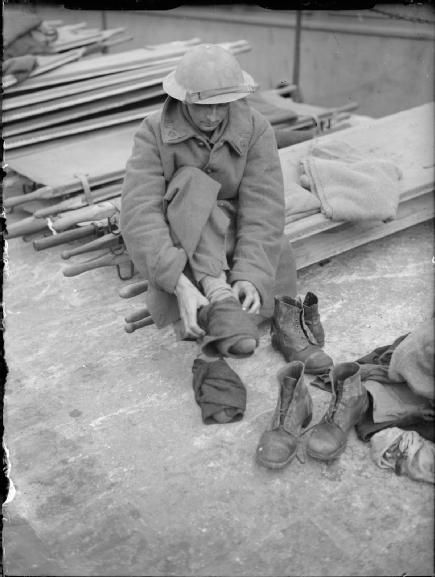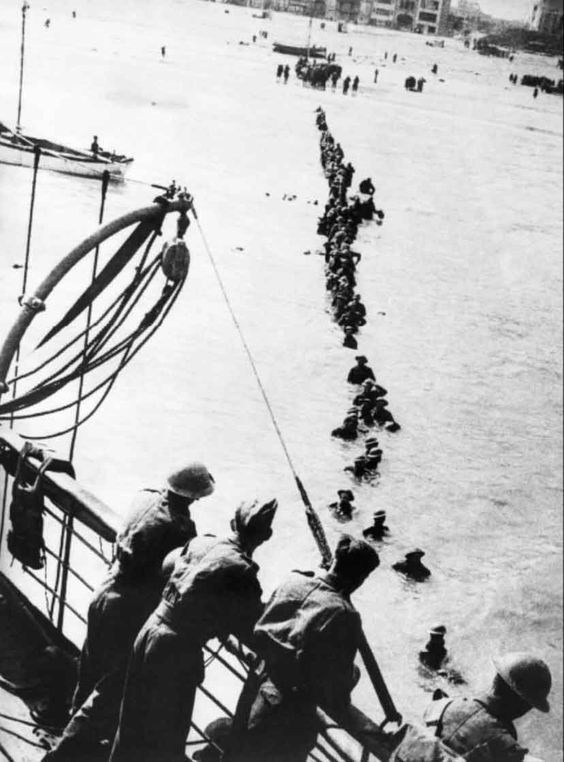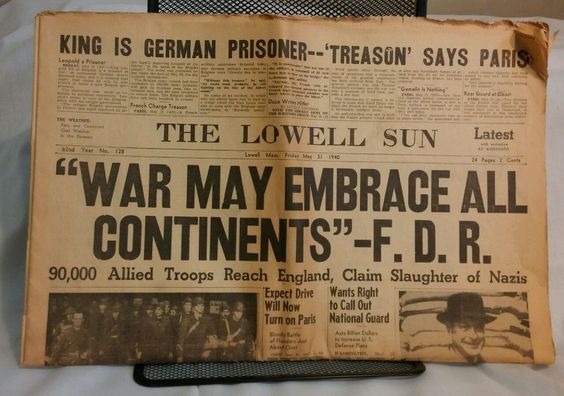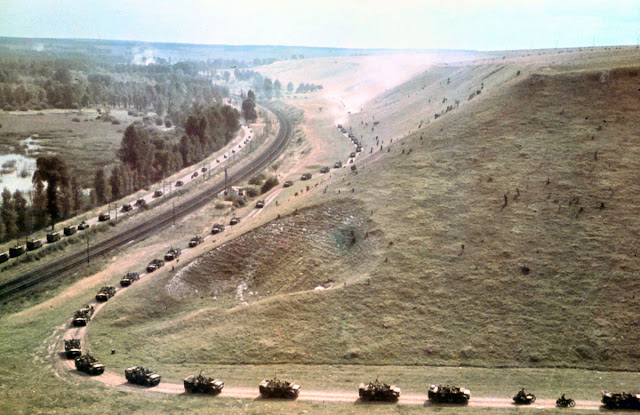Friday 31 May 1940
 |
| An evacuated British soldier, wearing a French overcoat, changes his socks and boots at Dover. 31 May 1940. |
Another British Member of Parliament dies at Dunkirk, Arnold Wilson, in a plane crash.
The Germans round up the last French stragglers at Lille.
General Alphonse Joseph Georges (Commander North-Eastern Front [including the BEF, though that is largely out of his hands]) orders a pause in Seventh Army actions against the German positions along the Somme. So far, the attacks, such as those by General de Gaulle with 4th Armoured Division, have been piecemeal and in some ways promising. Georges intends to make a major effort against the German bridgeheads to the south of the river in a few days.
There is some repositioning of Wehrmacht forces for the conquest of the rest of France.
General von Kuechler assumes command of all Wehrmacht forces at Dunkirk. He plans to launch a major offensive on 1 June.
The Germans make progress against the British perimeter at Nieuport. There are many individual instances of heroism, such as two British battalion commanders personally manning a Bren gun to stop the penetration.
The 2nd Battalion, Coldstream Guards has to move in quickly at Fumes to stop British troops from retreating. In a manner reminiscent of NKVD blocking forces, they set up positions behind the British forces and fire on those retreating, shooting some. The British soldiers return to their positions and hold the line against the Germans.
During the afternoon, the Germans make a penetration at the canal near Bulskamp, but the Durham Light Infantry stops them.
The Germans are throwing everything into the effort to stop the evacuations, and having some effect. E-boats torpedo French destroyers Sirocco and Cyclone, and the Luftwaffe damages 6 British destroyers (RN destroyers Express, Harvester, Icarus, Impulsive, Malcolm, and Scimitar and minesweeper Hebe). Both sides lose dozens of planes.
Charles Lightoller, the 66-year-old retired officer from the Titanic, owns a large motor yacht named Sundowner. Lightoller has done some work before for the Royal Navy in surveying the coast of the Continent. The Admiralty requisitions the Sundowner on the 31st, and Lightoller volunteers to sail it with his eldest son Roger (his youngest son perished on an RAF bombing raid on the first night of the war) to Dunkirk on the 1st of June.
There are 39 Dutch ships in the Allied cause assisting the evacuation.
Operations are cool and orderly - but enforced with iron discipline. Any solder not obeying orders is shot as necessary and left on the beach or in the water.
 |
| Approaching one of the "little ships," 31 May 1940. This is only possible with effective air cover. |
Eighteen RAF bombers attack the German at Nieuport during the night, inflicting major damage and spoiling plans for an attack there in the morning. Overall, 93 RAF planes attack the Germans around the perimeter during the night.
Operations slightly to the south continue as the French begin to worry more and more about a Wehrmacht breakthrough to the heart of France. The French send 20 LeO-451s against the German bridgeheads at Amiens and Abbeville. The attacks accomplish little - the panzers are at Dunkirk and Lille - and they lose 9 planes.
Douglas DB-7/A-20 Havocs strafe a German column near St. Quentin.
Battle of the Atlantic: For the month of May, shipping losses are:
In Atlantic:
100 Ships
285,893 tons
In Pacific:
1 Ship
2,568 tons
The Kriegsmarine has lost 1 U-boat.
In fact, that one loss during May 1940 happens today. U-13 (Oberleutnant zur See Max-Martin Schulte) is sunk by depth charges in the North Sea, 11 miles southeast of Lowestoft by sloop HMS Weston (L 72).
U-101 (Kapitänleutnant Fritz Frauenheim) torpedoes and sinks 5,775-ton freighter Orangemoor southwest of Roches Doures in the English Channel. There are 22 survivors, while 18 crew perish. U-101 then survives an 8-hour depth charge attack with 41 depth charges.
French destroyer Sirocco is attacked by German S-boats (Schnellboote) and Luftwaffe planes and sinks. About 600 French troops and 59 crew perish.
Norwegian ship Jadarland hits a mine and sinks. The mine had been laid by French submarine Rubis.
Convoy HG 32 departs from Gibraltar, Convoy SL 34 departs from Freetown, and Australian/New Zealand convoy US 3 departs from Cape Town for the UK.
Minesweeping trawler HMS Blackthorn (T 100) (J. G. Hilliard) is commissioned.
General Auchinleck ultimately awards Gubbins the DSO. Gubbins goes next to organize the Auxiliary Units, a Home Guard force to defend against a German invasion of Britain.
Lieutenant Colonel Stockwell, who successfully led the ground troops during the retreat, also is awarded a DSO. His next command is to run the Commando Training Center at Lochailort.
The British Army Independent Companies are disbanded. However, some of their troops become the embryo for the commandos.
The Allies are still pressing General Dietl's mountain troops near Narvik as he slowly retreats toward the border. He is patiently awaiting the arrival of 2d Mountain Division troops, which today reach Sorfold north of Bodo. Dietl is reinforced by 80 German troops who arrive on the train from Sweden.
War Crimes: There are reports of Luftwaffe aircraft machine-gunning hospital ships at Dunkirk, which are clearly marked. It is very difficult to prove such attacks, and some or all may be accidental.
US Government: President Roosevelt sends a message to Congress. He states that the changing nature of war, with expensive tanks and planes, requires a "billion-dollar defense program." He sends a supplementary $100 million defense bill to Congress as part of his $1.3 billion plan. He also states that he wants a law giving him authority:
call into active service such portion of the National Guard as may deemed necessary to maintain our position of neutrality and to safeguard the national defense, this to include authority to call into active service the necessary Reserve personnel.In Montevideo, Uruguay, the US ambassadors to Uruguay (Norman Armour) and Argentina (Edwin C. Wilson) confer. They send a telegram to Secretary of State Cordell Hull. In it, they suggest that "if the situation in the Far East permits," that the US might send a "large U.S. naval force, 40 or 50 vessels...to the east coast of South America." The purpose would be to "strengthen the position of those who desire to combat Hitlerism, as well as restore the confidence of those who are now wavering." They state that a US presence "more or less permanently in these waters would be an added assurance that we are prepared to give effective and immediate assistance if required."
The telegram is supported by the Chief of the Division of the American Republics (Laurence Duggan) in a conversation with the Undersecretary of State Sumner Welles. Duggan suggests that a higher profile be put on US interest in Latin American political developments. He says that a decision "to detach two or three cruisers to go down the east coast [of Latin America]" be made public "in order to put a little iron in the veins of our friends in those countries."
The telegram from the two ministers echoes one on 30 May from Wilson alone. To that one, Hull responds that the US is sending heavy cruiser Quincy (CA 39) to Rio de Janeiro, Brazil and then to Montevideo for "friendly visits of courtesy."
US Military: General Spaatz arrives in London to take up his position as Military Air Observer.
China: The Japanese announce plans to launch a terror bombing campaign against Chiang Kai-shek's capital Chungking "until the spirit of Chinese resistance is broken."
At the Battle of Tsaoyang-Ichang, the Japanese 11th Army attacks across the Han River at Yicheng and Ouchiamiao.
Italian Homefront: Private cars are banned to conserve gasoline - for the coming offensive against France.
British Homefront: Among other things, all street signs at crossroads are removed as a precaution against paratroopers.
 |
| The Lowell Sun, 31 May 1940. |
May 1940
May 1, 1940: British Leave ÅndalsnesMay 2, 1940: British Depart Namsos
May 3, 1940: Many Norwegians Surrendering
May 4, 1940: Bader Returns
May 5, 1940: HMS Seal Survives
May 6, 1940: Allies Focus on Narvik
May 7, 1940: In The Name of God, Go!
May 8, 1940: Exit Chamberlain
May 9, 1940: Enter Churchill
May 10, 1940: Fall Gelb
May 11, 1940: Eben Emael Surrenders
May 12, 1940: Germans at Sedan
May 13, 1940: Rommel at Work
May 14, 1940: German Breakout in France
May 15, 1940: Holland Surrenders
May 16, 1940: Dash to the Channel
May 17, 1940: Germans Take Brussels
May 18, 1940: Germans Take Antwerp
May 19, 1940: Failed French Counterattack
May 20, 1940: Panzers on the Coast
May 21, 1940: Battle of Arras
May 22, 1940: Attacking Channel Ports
May 23, 1940: British Evacuate Boulogne
May 24, 1940: Hitler's Stop Order
May 25, 1940: Belgian Defenses Creaking
May 26, 1940: Operation Dynamo
May 27, 1940: King Leopold Surrenders
May 28, 1940: The Allies Take Narvik
May 29, 1940: Lille Falls
May 30, 1940: Operation Fish
May 31, 1940: Peak Day for Dynamo
June 1940
June 1, 1940: Devastation at Dunkirk
June 2, 1940: Hitler Visits France
June 3, 1940: Operation Paula
June 4, 1940: We Shall Fight
June 5, 1940: Fall Rot
June 6, 1940: Weygand Line Crumbling
June 7, 1940: British Evacuating Narvik
June 8, 1940: Operation Juno
June 9, 1940: Norway Capitulates
June 10, 1940: Mussolini Throws Down
June 11, 1940: Paris an Open City
June 12, 1940: Rommel at St. Valery
June 13, 1940: France Goes Alone
June 14, 1940: Paris Falls
June 15, 1940: Soviets Scoop Up Lithuania
June 16, 1940: Enter Pétain
June 17, 1940: The Lancastria Sinks
June 18, 1940: A Day of Leaders
June 19, 1940: U-boats Run Wild
June 20, 1940: Pétain Wilts
June 21, 1940: Hitler's Happiest Day
June 22, 1940: France Is Done
June 23, 1940: Hitler in Paris
June 24, 1940: Six Million Jews
June 25, 1940: German Celebrations
June 26, 1940: USSR Being Belligerent
June 27, 1940: Malta in Peril
June 28, 1940: Channel Islands Bombed
June 29, 1940: Gandhi Insists on Independence
June 30, 1940: Channel Islands Occupied
2020


No comments:
Post a Comment